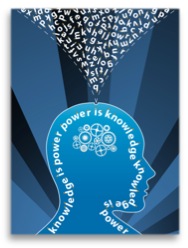Overcoming Overload:
More Tips for Eliminating “Decision Gridlock”
by Adele Sommers
Are you overwhelmed by a constant state of overload? It’s certainly one reason why we can have trouble making decisions, taking an action, or choosing a direction.
 In a previous article, I discussed two of the frustrating situations that can keep us mired in what I call “decision gridlock”: In a previous article, I discussed two of the frustrating situations that can keep us mired in what I call “decision gridlock”:
- Worrying incessantly about the “perfect” move
- The desired move seems too intimidating (or too simple)
When dealing with those challenges, some of the remedies include finding low-risk, low-cost ways to research or try out options before committing to anything. Also, by deconstructing a giant “grand vision” into small steps, and taking only one small step one a time, we can let our successes build momentum and carry us forward at just the right pace.
The article below discusses three more variations of “decision gridlock” that tend to surface because of overload. Overload can strike stealthily, while we’re least expecting it, such as when we suddenly (or gradually) have:
- Too much information, or an unclear idea of how to apply it
- Too many pressing tasks, responsibilities, or goals to handle at one time
- Too many intertwined issues, where everything remains frozen until one aspect finally moves forward
Too Much Information to Process at Once
 The amount of information available in the world today has exploded, and still seems to be growing exponentially! We have moved from the Information Age into an era of merely trying to attract and retain people’s awareness, interest and concentration — making human attention one of our scarcest commodities. The amount of information available in the world today has exploded, and still seems to be growing exponentially! We have moved from the Information Age into an era of merely trying to attract and retain people’s awareness, interest and concentration — making human attention one of our scarcest commodities.
Take Ricardo’s situation, for example. Ricardo is a budding entrepreneur who’s trying to learn how to design a new product, market it, set up a blog site, and install an e-commerce system all at the same time. He has been researching all of these topics online and in bookstores. With this much input, he is feeling so overwhelmed that he’s now tempted to give up on all of these projects. What can he do?
Consider what would happen if Ricardo aimed to acquire the information he needs just in time instead of just in case. What’s the difference?
- In the just-in-case mode, you gather and read everything that might apply, “just in case you need it someday.” That can soon become overwhelming!
- In the just-in-time mode, you restrict your research to only what serves your immediate needs. You simply shut out everything else by putting it on the side burner until you are ready for it. When the next task comes up on your list, you do your research or comb through your saved information, focusing on only that topic.
By switching to a just-in-time approach, you should soon start experiencing a restored sense of focus that will help you proceed systematically through your resources, thus laying a foundation for success.
Too Many Pressing Tasks or Goals to Focus on at One Time
 Similar to having too much information, in this situation, Ricardo should stop juggling all things at once and focus on prioritizing everything he needs to get done. Similar to having too much information, in this situation, Ricardo should stop juggling all things at once and focus on prioritizing everything he needs to get done.
That way, he can concentrate entirely on the very next goal or task on his daily or weekly task list. When he looks at all of the tasks put together, it feels daunting. When he looks at just the next task on the list, it feels doable.
After you sequence your goals and tasks, the key is to stay extremely focused on what to do first, second, and third. If you’re working on Task One and worries about Task Three creep in, just tell yourself, “I’ll cross that bridge when I come to it!”
Then do your utmost to take one step at a time, and don’t let anything derail you as you methodically work through your list.
Every Action Depends on Another Action Occurring First
Otherwise known as a “circular dilemma,” this pattern presents a tricky game plan because all possible moves seem interdependent. This state of affairs might arise when it appears that every aspect of your business growth depends on one or more of the following: 1) carving out more time, 2) generating more income, or 3) getting more help.
Often, each goal seems impossible to attain without first achieving the other two! As long as the situation remains frozen without a breakthrough, one can experience an extreme case of overload.
Take Mark’s Web design business. It’s drowning in unfinished tasks as he struggles to wear every hat. He’s trying to serve his clients’ needs, seek new clients, advertise his services, keep his invoicing current, handle inquiries and interruptions, manage all administrative details, and also see his family for a few hours on weekends. He knows he needs help, but he can’t figure out which priority comes first to dig himself out of the quagmire.
 In these situations, I usually help my clients with a root cause analysis to identify which of the needs or issues seem to be producing the majority of the overload. Invariably, one or two issues will surface above all others as the underlying causes. In these situations, I usually help my clients with a root cause analysis to identify which of the needs or issues seem to be producing the majority of the overload. Invariably, one or two issues will surface above all others as the underlying causes.
Whichever issue emerges as the greatest source of inundation, it’s the one to target first. Relentlessly pursue that one issue until it’s resolved. Remain attentive, and try not to become sidetracked by tackling more than one major need at a time. When the first need is conquered, only then jump to the next one.
In conclusion, by continually prioritizing what needs to get done, focusing on one step at a time, and collecting information just in time instead of just in case, you can overcome the overload resulting from too many tasks and too much input. Then, by using a root cause analysis to determine which issues are producing the most grief, and systematically resolving only one at a time, you can eliminate the circular dilemmas that keep you from enjoying the success you deserve!
Copyright 2017 Adele Sommers
|


